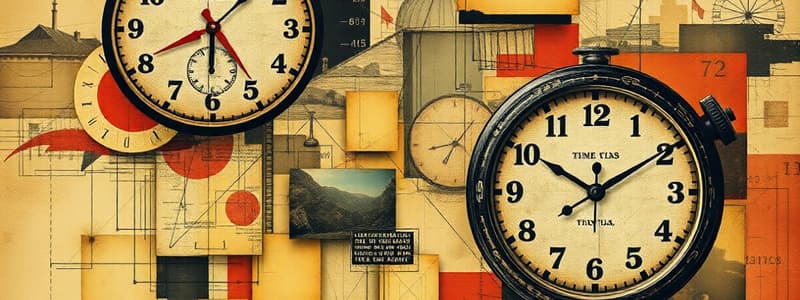Podcast
Questions and Answers
Which measurement represents time accurately in this context?
Which measurement represents time accurately in this context?
- Days in a week
- Hours in a day
- Minutes before noon
- Seconds past midnight (correct)
What is the significance of using time as a reference in the presented images?
What is the significance of using time as a reference in the presented images?
- It relates to geographical differences.
- It establishes a chronological order. (correct)
- It highlights seasonal variations.
- It indicates the completion of events.
How can time intervals be interpreted based on the data presented?
How can time intervals be interpreted based on the data presented?
- As flexible periods defined by context. (correct)
- As fixed durations that cannot change.
- As rigid components that follow a strict sequence.
- As arbitrary measures with no significant meaning.
What aspect of time is least likely to influence decision-making?
What aspect of time is least likely to influence decision-making?
Which element is crucial for accurately measuring time based on the images?
Which element is crucial for accurately measuring time based on the images?
Flashcards are hidden until you start studying
Study Notes
Time Concepts
- Time is a continuous progression that diminishes the ability to perceive events in the past and predict those in the future.
- It is often divided into three categories: past, present, and future, each holding different philosophical and scientific significance.
Measurement of Time
- Time measurement has evolved from natural patterns (like lunar cycles or solar days) to precise units such as seconds, minutes, and hours.
- The introduction of clock systems, such as sundials and mechanical clocks, enhanced time standardization.
Psychological Aspects of Time
- Our perception of time can vary based on emotional states, age, and cultural backgrounds, leading to phenomena like “time flies” or “time crawls”.
- Psychological time can influence decision-making and stress levels.
Philosophical Perspectives
- Philosophers debate whether time is an objective reality or a human construct, leading to varied interpretations across cultures and eras.
- Theories such as presentism (only the present is real) and eternalism (past, present, and future coexist) offer different views on the nature of time.
Time in Physics
- Einstein's theory of relativity revolutionized the understanding of time, linking it to the fabric of space and suggesting that it can be affected by speed and gravity.
- Concepts like time dilation illustrate how time can flow at different rates under varying conditions.
Cultural Interpretations of Time
- Different cultures prioritize time uniquely: western cultures often view it linearly, while many eastern cultures view time cyclically.
- Rituals, calendars, and perceptions of punctuality reflect cultural attitudes toward time.
Time Management
- Effective time management is crucial for personal productivity and overall well-being, incorporating goal setting and prioritization techniques.
- Tools like planners and digital calendars assist individuals in organizing their time efficiently.
Technological Impact
- Advances in technology have drastically changed how time is measured and perceived, with digital devices enabling real-time tracking and reminders.
- The internet has created a 'hyper-speed' culture where instantaneous communication influences our relationship with time.
Studying That Suits You
Use AI to generate personalized quizzes and flashcards to suit your learning preferences.




